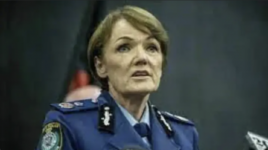NSW Police Commissioner Seeks to Influence Composition of Coroners Court

An interesting and somewhat concerning stoush is has been unfolding which involves the New South Wales Police Force and the State Coroner’s office.
The situation relates to Police Commissioner Karen Webb ‘quietly’ accusing Deputy Coroner Harriet Grahame of ‘perceptual bias’ and suggesting she be removed from nearly all cases involving deaths at the hands of police, after Ms Grahame’s elderly and frail mother was subjected to what appears to be excessive police force.
To understand what’s going on, we need to take a step back.
The background
Earlier this year, 95-year old Clare Nowland died after being tasered by New South Wales police officer Kristian White in a care facility for dementia patients in the Cooma on 17 May 2023.
Shortly thereafter, another story began circulating which involved an 81-year old woman named Rachel Grahame handcuffed by police for waving a lanyard at them at a Sydney nursing home in 2020.
Rachel Grahame also suffered dementia. She weighed just 45kg. Six police officers were in attendance and she screamed in pain as she was placed in handcuffs.
When paramedics arrived, they told police that Ms Grahame needed to be taken to hospital as a result of injuries she sustained during the encounter. She spent the following six weeks there.
Rachel’s daughter, Emma, spoke to some media outlets, and also raised the issue on social media, releasing police body-worn camera footage of the incident.
A civil suit, against NSW Police for assault, battery and false imprisonment was settled with a compensation payment by the NSW State Government in 2021.
A personal matter that can no longer be kept private
Emma never once mentioned her sister, New South Wales Deputy Coroner Harriet Grahame, and Ms Grahame did not let it be publicly known that Rachel was her mother and Emma her sister.
In recent weeks Ms Graham has been no longer able to keep this matter private, because the New South Wales Police Commissioner, Karen Webb, has called for the New South Wales Coroner’s office to consider Ms Graham’s “perception of bias” and the “appropriateness” of her presiding over matters before the Coroner’s Court that involve New South Wales Police.
A letter sent to the Coroner’s Office from the New South Wales Police, says:
“The Commissioner’s view is that what occurred with Ms Grahame might give rise to a perception of bias on DSC Grahame’s part, especially when she is presiding over matters in relation to the use of police powers, vulnerable persons or use of force,” the letter read.
‘Perception’ of bias is not the same as clear evidence of bias
Karen Webb has asked the NSW Coroner to consider “the appropriateness” of Ms Grahame “continuing to preside over matters involving the Commissioner and NSWPF officers.”
But Ms Grahame herself is now fighting back against any perceptions that she incapable of presiding impartially over any inquest.
She is refusing to step down as the Coroner leading an inquest into the death of Andrew Chee Quee who was shot by New South Wales police in 2020 after allegedly threatening to kill them.
Ms Grahame disclosed the incident with her mother to the Court at the start of the inquest, and while Karen Webb herself did not make an application against Ms Grahame presiding, another police officer did so, which was supported by Karen Webb.
Most Coronial Inquests involve police actions in some way
In a document published last week, Ms Grahame outlined that she would not be excusing herself from the case, making the very valid point that:
“Almost all matters in the coronial jurisdiction have some involvement by the NSWPF in one way or another and that a large proportion of the work of a deputy state coroner involves presiding over matters where the operation of police powers may be an issue.”
Under the law, a Coroner will also be asked to investigate and make findings if there is a death in custody, or as a result of police operations.
In addition, a Coroner is expected to produce a detailed report which will be both critical and complimentary of all involved, not solely police, and will make recommendations to ensure that key learnings from any incident can be put into practice.
Further – There is a high degree of transparency around Coronial Inquests. The vast majority of Coroner’s Reports are publicly available to anyone who wishes to read them. Protected documents are only those which relate specifically to individuals or contain information of a private or highly sensitive nature.
The Coroner has no power to punish, only to make recommendations
In some cases, a Coroner may recommend criminal charges against a particular person or person/s, but the Department of Public Prosecutions will ultimately decide whether or not to pursue prosecution based on a number of factors, including the significance of evidence, the applicability of evidence to the law, and the probability of securing a conviction, balanced with the public interest in taking the matter further.
In fact, since the incident with her mother, Ms Grahame has presided over a number of Coronial Inquests which have probed the actions of police under various circumstances, including at least three inquests which investigated deaths in custody.
Harriet Grahame has an impeccable reputation. Why this is being questioned now is quite unfathomable, and only serves to add to the New South Wales Police Force’s growing reputation for white washing and cover ups.
It’s well documented that police have been known to act on ‘perceptions of bias’ including systemic racism, in their day-to-day duties and yet, individuals are rarely removed from the force for this bias.
Even when criminal charges are laid against an individual officer, typically that individual is suspended with pay, or removed from active duty, and given a “back room” position until the case goes to trial.
Police maintain the principle of “innocent until proven guilty” with their own, yet cannot seem to extend that principle to Ms Grahame, wanting her removed without any tangible evidence of “perceptions of bias”, only a fairly baseless ‘concern’ that this may be the case.
While we’re getting used to the “double-standards”, this is a stark reminder of just how powerful police have become, or how powerful they think they are – believing they have a right to interfere with the justice process in such a blatant way.
It also begs the question – what have they got to hide’?
If police officers didn’t continue to use excessive or unnecessary force (including weapons) when it’s not warranted, or were impartial in their views of, and treatment of, the individuals they deal with on a daily basis, and more transparent and accountable about the way they conduct their operations, then there would be no need for this type of ridiculous paranoia, which is only delaying the inquest process, and wasting bureaucratic resources that could be better focused elsewhere.







